Regulation of International Financial Markets and International Banking
This research group analyses causes and consequences of banks' international activities and the regulatory framework they operate in.
Internationally active banks can facilitate an efficient international allocation of capital and provide channels for international risk sharing. But they can also be a source of financial instabilities themselves, thus contributing to international contagion and risk-shifting. This is one reason for the current re-regulation of international banking.
The research group contributes to the literature in three ways. First, the group empirically analyses the channels through which shocks are transmitted by internationally active banks. Second, the group analyses the build-up of aggregate imbalances in integrated banking markets and resulting consequences for the real economy. Third, the group analyses the impact of changes in banking supervision and regulation on (inter)national activities of banks, with a special focus on the European integration process.
IWH Data Project: International Banking Library
Research Cluster
Economic Dynamics and StabilityYour contact

Mitglied - Department Financial Markets
EXTERNAL FUNDING
07.2017 ‐ 12.2022
The Political Economy of the European Banking Union
European Social Fund (ESF)
Causes of national differences in the implementation of the Banking Union and the resulting impact on financial stability.
01.2015 ‐ 12.2017
Dynamic Interactions between Banks and the Real Economy
German Research Foundation (DFG)
Refereed Publications
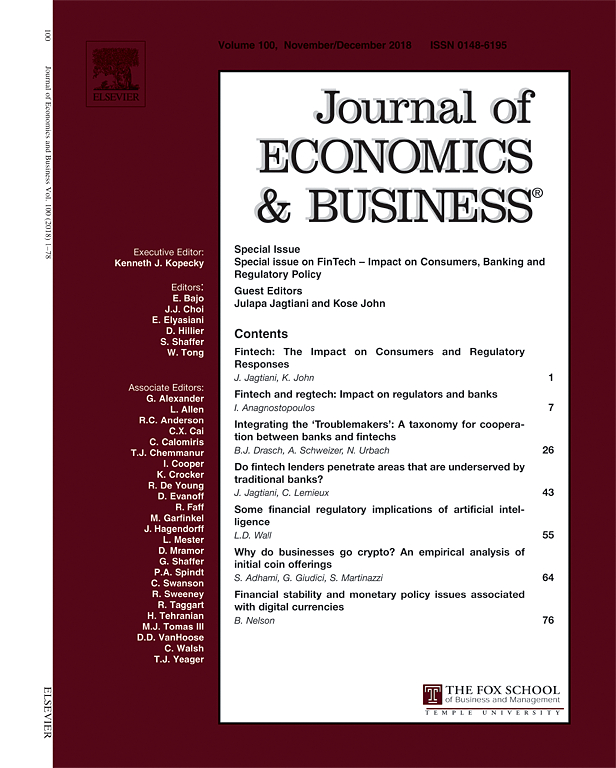
Does It Pay to Get Connected? An Examination of Bank Alliance Network and Bond Spread
in: Journal of Economics and Business, forthcoming
Abstract
This paper examines the effects of bank alliance network on bonds issued by European banks during the period 1990–2009. We construct six measures capturing different dimensions of banks’ network characteristics. In opposition to the results obtained for non-financial firms, our findings indicate that being part of a network does not create value for bank’s bondholders, indicating a dark side effect of strategic alliances in the banking sector. While being part of a network is perceived as a risk-increasing event by market participants, this negative perception is significantly lower for the larger banks, and, to a lesser extent, for the more profitable banks. Moreover, during crisis times, the positive impact on bond spread of a bank’s higher centrality or of a bank’s higher connectedness in the network is stronger, indicating that market participants may fear spillover effects within the network during periods of banks’ heightened financial fragility.
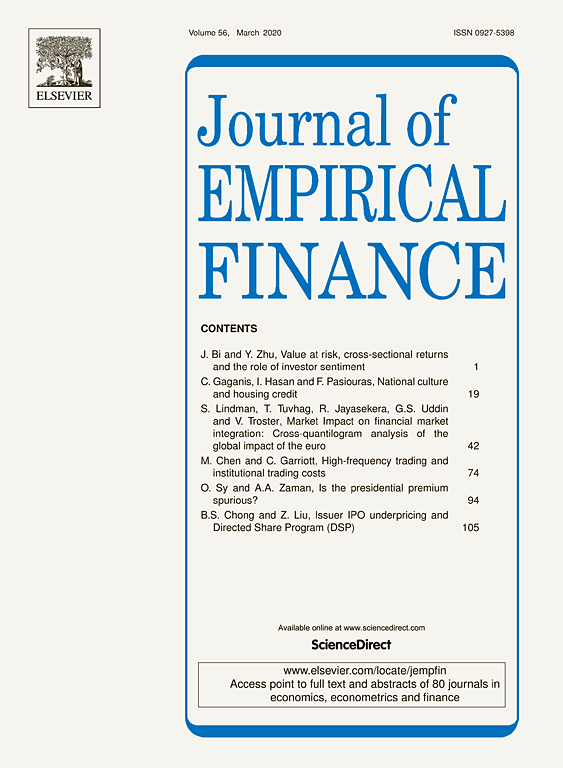
Ownership Structure and the Cost of Debt: Evidence From the Chinese Corporate Bond Market
in: Journal of Empirical Finance, September 2023
Abstract
Drawing upon evidence from the Chinese corporate bond market, we study how ownership structure affects the cost of debt for firms. Our results show that state, institutional and foreign ownership formats reduce the cost of debt for firms. The benefits of state ownership are accentuated when the issuer is headquartered in a province with highly developed market institutions, operates in an industry less dominated by the state or during the period after the 2012 anti-corruption reforms. Institutional ownership provides the most benefits in environments with lower levels of marketization, especially for firms with low credit quality. Our evidence sheds light on the nexus of ownership and debt cost in a political economy where state-owned enterprises (SOEs) and non-SOEs face productivity and credit frictions. It is also illustrative of how the market environment interacts with corporate ownership in affecting the cost of bond issuance.
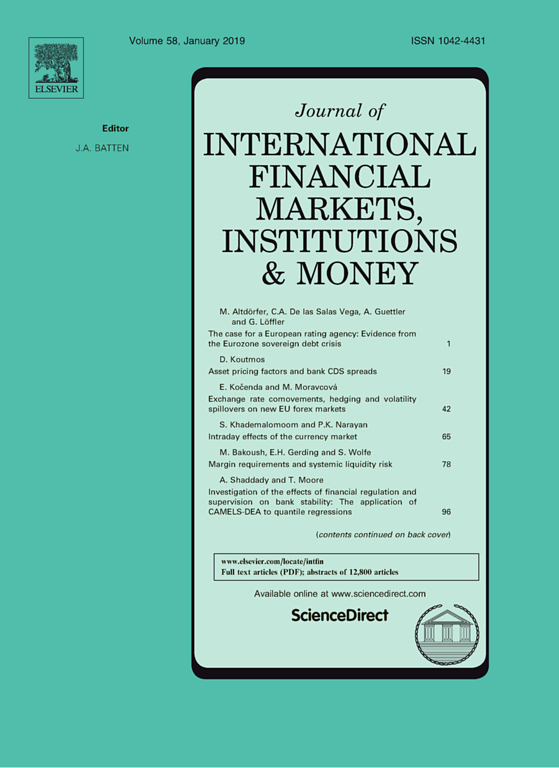
Cultural Values of Parent Bank Board Members and Lending by Foreign Subsidiaries: The Moderating Role of Personal Traits
in: Journal of International Financial Markets, Institutions and Money, March 2023
Abstract
In this study, we investigate whether the cultural values of a parent bank’s board members affect lending by the bank’s foreign subsidiaries and how this influence is moderated by the board members’ personal traits. Using a new dataset on foreign-owned banks and their parent companies, we find that average individualism, uncertainty avoidance, and indulgence within parent bank boards significantly impact lending by foreign subsidiaries. We establish that different sensitivities of female and male directors modify the relevance of individual cultural dimensions in lending by foreign bank subsidiaries. Moreover, we show that parent bank directors’ cultural values have a stronger impact on lending by the bank’s foreign subsidiaries when those directors have enough time to fulfill their duties and possess higher ownership stakes in the parent companies.
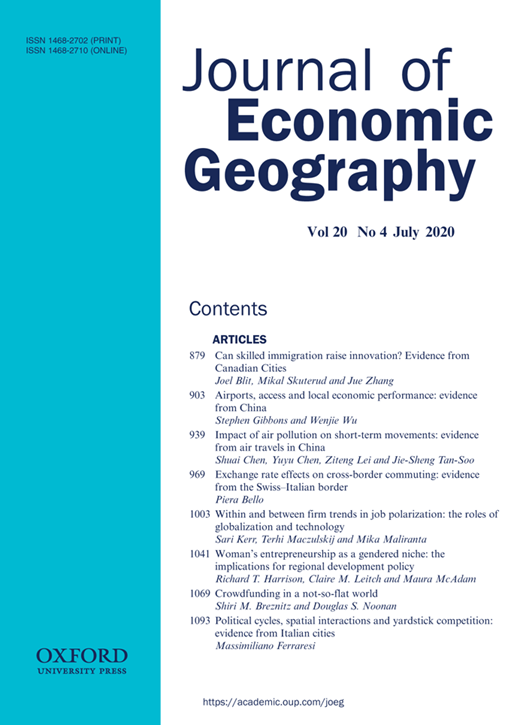
The Geography of Information: Evidence from the Public Debt Market
in: Journal of Economic Geography, No. 1, 2023
Abstract
nWe investigate the link between the spatial concentration of firms in large, central metropolitans (i.e. urban agglomeration) and the cost of public corporate debt. Looking at bond issues over the period 1985–2014, we find that bonds issued by companies headquartered in urban agglomerates have lower at-issue yield spreads than bonds issued by firms based in remote, sparsely populated areas. Measures of the count of institutional bondholders in a firm’s vicinity confirm that the spatial cross-sectional variation in bond spreads is driven by the proximity of metropolitan firms to large concentrations of institutional investors. Our results are robust to controls for firm productivity and governance, analyst following, and exogenous shocks to institutional investor attention. The effect of headquarters location on bond spreads is especially pronounced for more difficult to value, speculative-grade bonds, bonds issued by smaller, less visible firms and bonds issued without protective covenants. Overall, we provide evidence that the geographical distribution of firms and investors generates a corresponding distribution of value-relevant, firm-level information that affects its cost of capital.
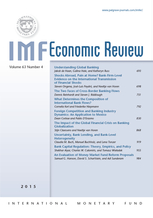
Financial Linkages and Sectoral Business Cycle Synchronization: Evidence from Europe
in: IMF Economic Review, December 2022
Abstract
We analyze whether financial integration leads to converging or diverging business cycles using a dynamic spatial model. Our model allows for contemporaneous spillovers of shocks to GDP growth between countries that are financially integrated and delivers a scalar measure of the spillover intensity at each point in time. For a financial network of ten European countries from 1996 to 2017, we find that the spillover effects are positive on average and much larger during periods of financial stress, pointing towards stronger business cycle synchronization. Dismantling GDP growth into value added growth of ten major industries, we observe that spillover intensities vary significantly. The findings are robust to a variety of alternative model specifications.
Working Papers
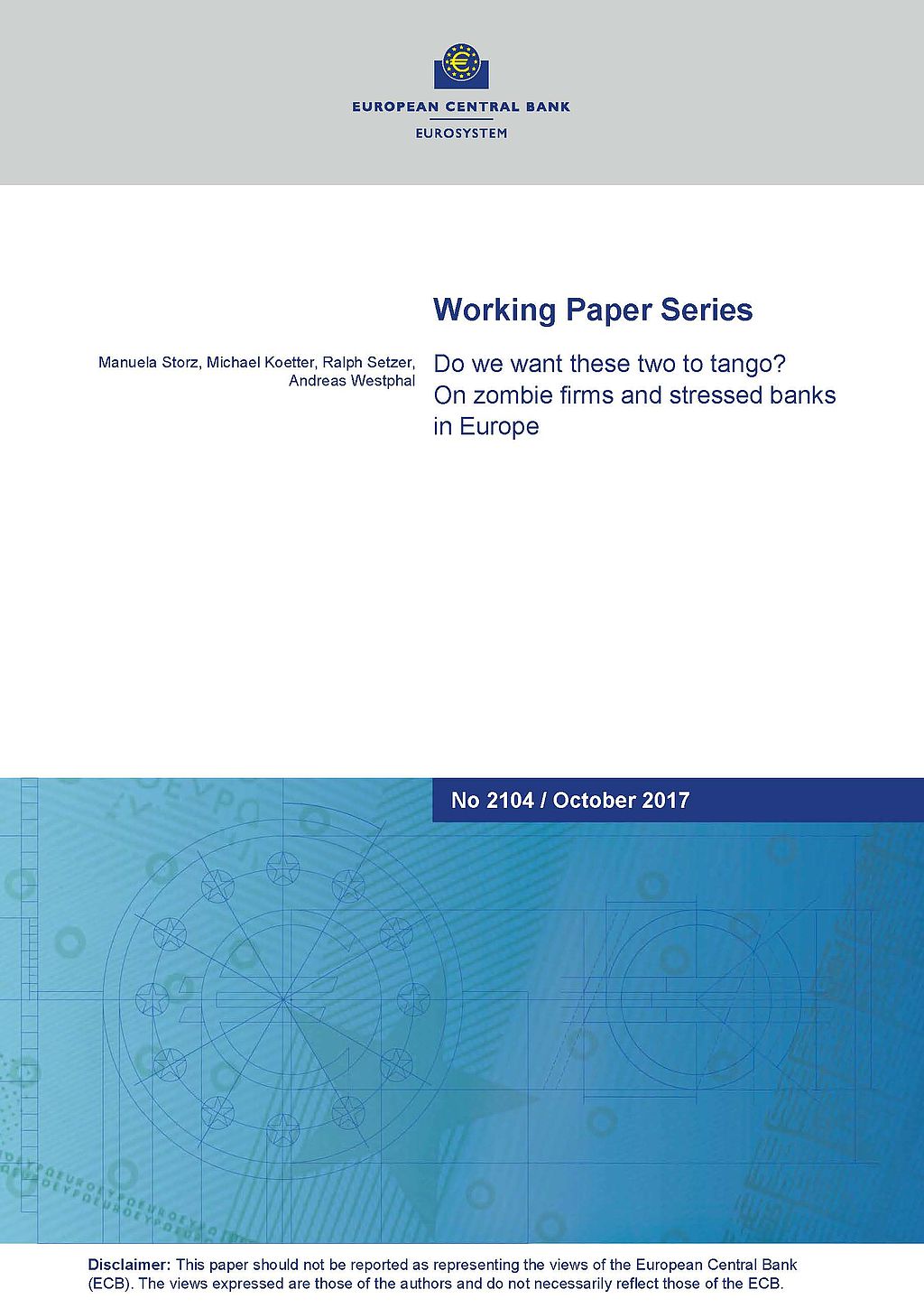
Do We Want These Two to Tango? On Zombie Firms and Stressed Banks in Europe
in: ECB Working Paper, 2017
Abstract
We show that the speed and type of corporate deleveraging depends on the interaction between corporate and financial sector health. Based on granular bank-firm data pertaining to small and medium-sized enterprises (SME) from five stressed and two non-stressed euro area economies, we show that “zombie” firms generally continued to lever up during the 2010–2014 period. Whereas relationships with stressed banks reduce SME leverage on average, we also show that zombie firms that are tied to weak banks in euro area periphery countries increase their indebtedness even further. Sustainable economic recovery therefore requires both: deleveraging of banks and firms.

Do We Want These Two to Tango? On Zombie Firms and Stressed Banks in Europe
in: IWH Discussion Papers, No. 13, 2017
Abstract
We show that the speed and type of corporate deleveraging depends on the interaction between corporate and financial sector health. Based on granular bank-firm data pertaining to small and medium-sized enterprises (SME) from five stressed and two non-stressed euro area economies, we show that “zombie” firms generally continued to lever up during the 2010–2014 period. Whereas relationships with stressed banks reduce SME leverage on average, we also show that zombie firms that are tied to weak banks in euro area periphery countries increase their indebtedness even further. Sustainable economic recovery therefore requires both: deleveraging of banks and firms.

Inside Asset Purchase Programs: The Effects of Unconventional Policy on Banking Competition
in: ECB Working Paper Series, No. 2017, 2017
Abstract
We test if unconventional monetary policy instruments influence the competitive conduct of banks. Between q2:2010 and q1:2012, the ECB absorbed Euro 218 billion worth of government securities from five EMU countries under the Securities Markets Programme (SMP). Using detailed security holdings data at the bank level, we show that banks exposed to this unexpected (loose) policy shock mildly gained local loan and deposit market shares. Shifts in market shares are driven by banks that increased SMP security holdings during the lifetime of the program and that hold the largest relative SMP portfolio shares. Holding other securities from periphery countries that were not part of the SMP amplifies the positive market share responses. Monopolistic rents approximated by Lerner indices are lower for SMP banks, suggesting a role of the SMP to re-distribute market power differentially, but not necessarily banking profits.
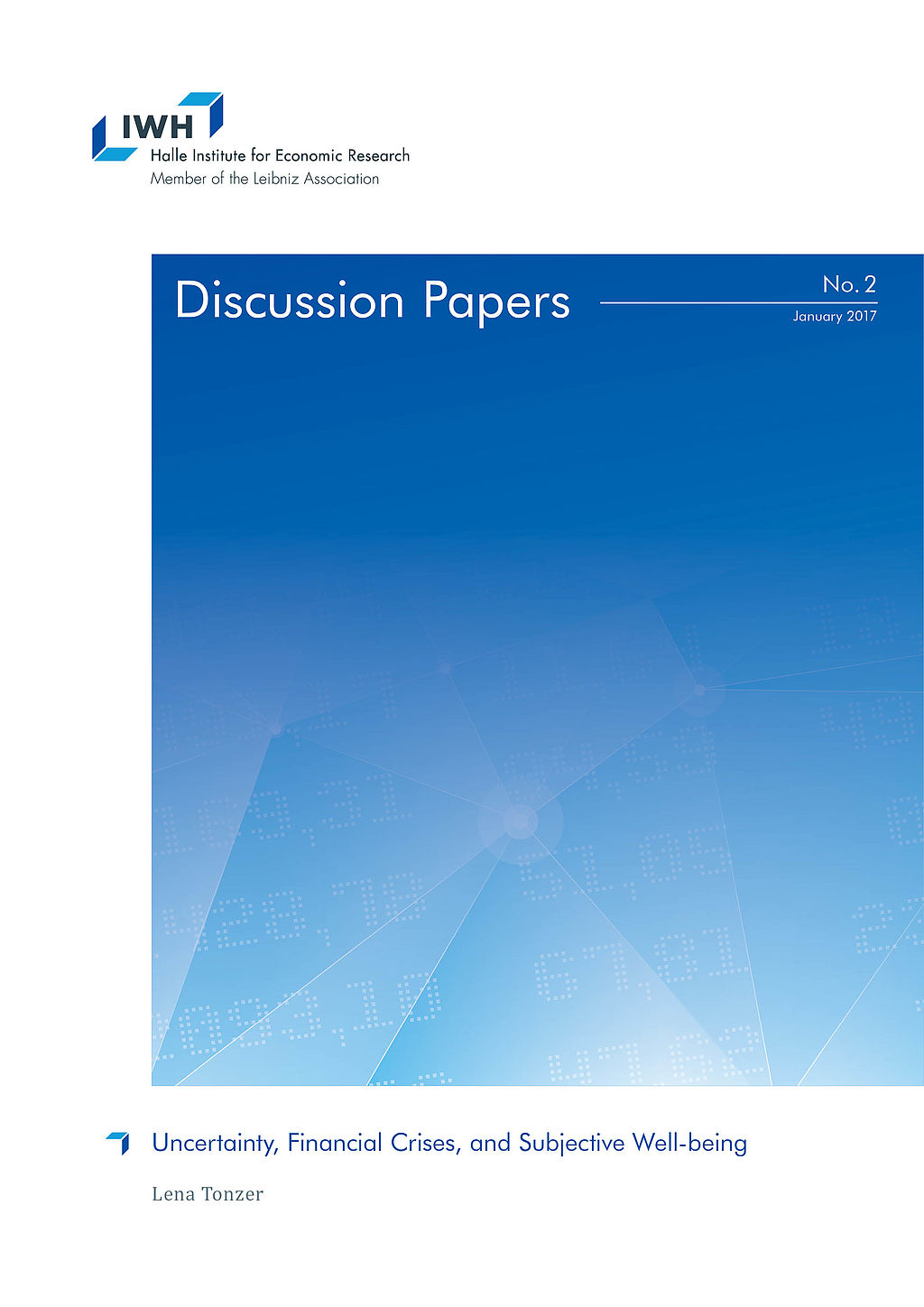
Uncertainty, Financial Crises, and Subjective Well-being
in: IWH Discussion Papers, No. 2, 2017
Abstract
This paper focuses on the effect of uncertainty as reflected by financial market variables on subjective well-being. The analysis is based on Eurobarometer surveys, covering 20 countries over the period from 2000 to 2013. Individuals report lower levels of life satisfaction in times of higher uncertainty approximated by stock market volatility. This effect is heterogeneous across respondents: The probability of being unsatisfied is higher for respondents who are older, less educated, and live in one of the GIIPS countries of the euro area. Furthermore, higher uncertainty in combination with a financial crisis increases the probability of reporting low values of life satisfaction.
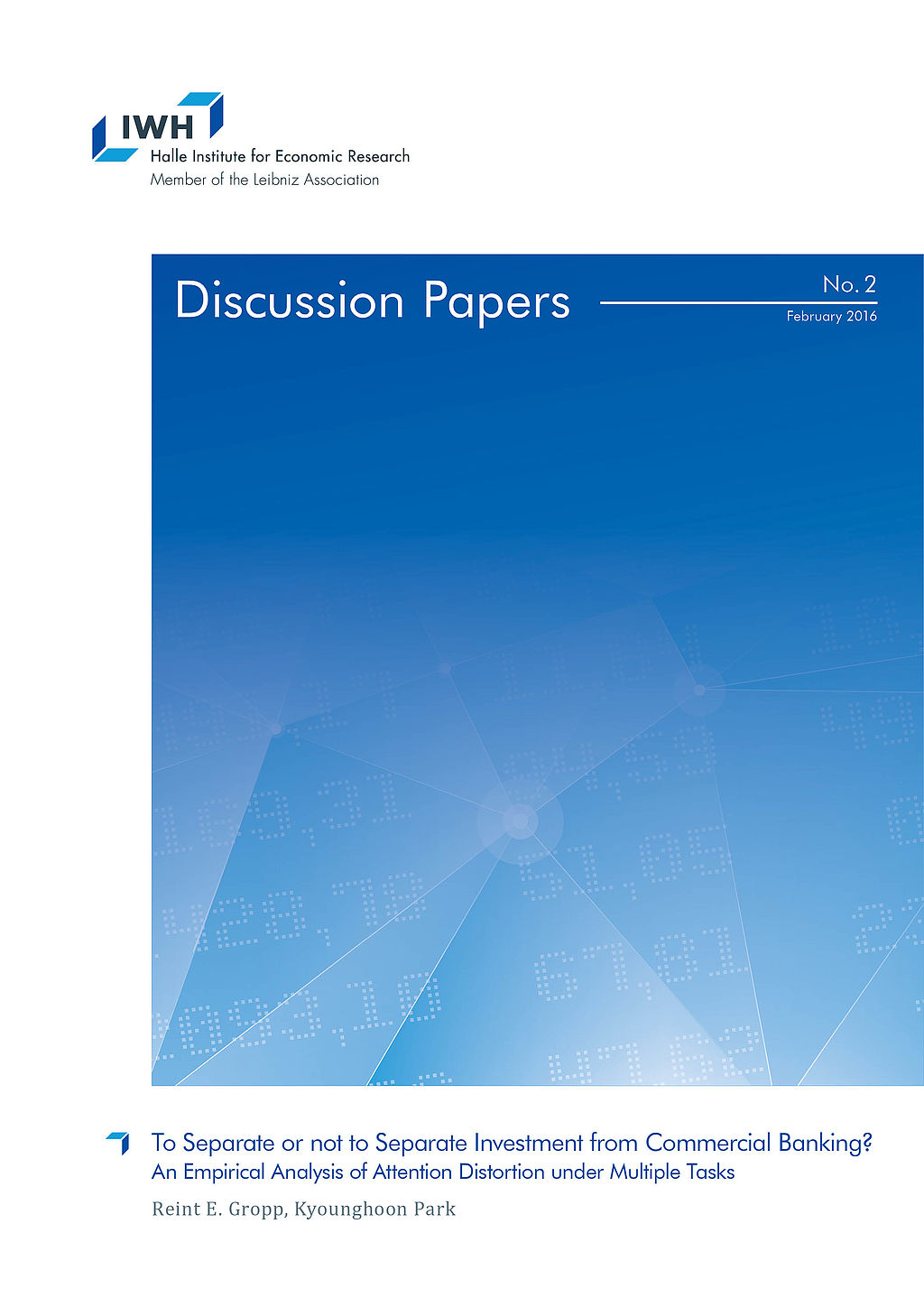
To Separate or not to Separate Investment from Commercial Banking? An Empirical Analysis of Attention Distortion under Multiple Tasks
in: IWH Discussion Papers, No. 2, 2016
Abstract
In the wake of the 2008/2009 financial crisis, a number of policy reports (Vickers, Liikanen, Volcker) proposed to separate investment banking from commercial banking to increase financial stability. This paper empirically examines one theoretical justification for these proposals, namely attention distortion under multiple tasks as in Holmstrom and Milgrom (1991). Universal banks can be viewed as combining two different tasks (investment banking and commercial banking) in the same organization. We estimate pay-performance sensitivities for different segments within universal banks and for pure investment and commercial banks. We show that the pay-performance sensitivity is higher in investment banking than in commercial banking, no matter whether it is organized as part of a universal bank or in a separate institution. Next, the paper shows that relative pay-performance sensitivities of investment and commercial banking are negatively related to the quality of the loan portfolio in universal banks. Depending on the specification, we obtain a reduction in problem loans when investment banking is removed from commercial banks of up to 12 percent. We interpret the evidence to imply that the higher pay-performance sensitivity in investment banking directs the attention of managers away from commercial banking within universal banks, consistent with Holmstrom and Milgrom (1991). Separation of investment banking and commercial banking may indeed be associated with a reduction in risk in commercial banking.














